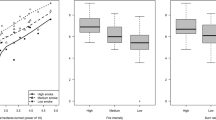
Overview
Provides a roadmap for improving smoke and fire management
Documents the current understanding of smoke science
Addresses the issues surrounding the production of smoke from wildland fires
This book is open access, which means that you have free and unlimited access
Buy print copy
Tax calculation will be finalised at checkout
About this book
This open access book synthesizes current information on wildland fire smoke in the United States, providing a scientific foundation for addressing the production of smoke from wildland fires. This will be increasingly critical as smoke exposure and degraded air quality are expected to increase in extent and severity in a warmer climate. Accurate smoke information is a foundation for helping individuals and communities to effectively mitigate potential smoke impacts from wildfires and prescribed fires. The book documents our current understanding of smoke science for (1) primary physical, chemical, and biological issues related to wildfire and prescribed fire, (2) key social issues, including human health and economic impacts, and (3) current and anticipated management and regulatory issues. Each chapter provides a summary of priorities for future research that provide a roadmap for developing scientific information that can improve smoke and fire management over the next decade.
Similar content being viewed by others
Keywords
Table of contents (8 chapters)
-
Front Matter
-
Back Matter
Editors and Affiliations
About the editors
David L. Peterson is a Professor of Forest Biology at the University of Washington and formerly a Senior Scientist with the U.S. Forest Service, Pacific Northwest Research Station. He has conducted research on fire science and climate change throughout the western United States, was affiliated with the Intergovernmental Panel on Climate Change, and co-led the Forests chapter of the Fourth National Climate Assessment. He currently works on interdisciplinary teams to develop climate change assessments and adaptation strategies for national forests and other public lands.
Sarah McCaffrey, Ph.D. is a Research Forester with the USDA Forest Service, Rocky Mountain Research Station. Her research focuses on the social aspects of fire management. This has included projects examining risk perception, social acceptability of prescribed fire, homeowner mitigation decisions, risk communication, and social issues that occur during and after fires such as evacuation decision making and agency-community interactions. More recent work has focused on internal fire management considerations including barriers to use of fire as a management tool.
Dr. Toral Patel-Weynand is the Director of Sustainable Forest Management Research for the U.S. Department of Agriculture, Forest Service. She has co-authored several U.S. National Assessments such as the Climate Change and United States Forests assessment. Other national assessments include the first-ever scientific assessment on agroforestry as a mechanism for improving the resiliency and productivity of farm and ranch lands and an assessment of nontimber forest products. Most recent publications include the Invasive Species in Forests and Rangelands of the United States and Forests and Rangeland Soils of the United States Under Changing Conditions.
Bibliographic Information
Book Title: Wildland Fire Smoke in the United States
Book Subtitle: A Scientific Assessment
Editors: David L. Peterson, Sarah M. McCaffrey, Toral Patel-Weynand
DOI: https://doi.org/10.1007/978-3-030-87045-4
Publisher: Springer Cham
eBook Packages: Earth and Environmental Science, Earth and Environmental Science (R0)
Copyright Information: This is a U.S. government work and not under copyright protection in the U.S.; foreign copyright protection may apply 2022
License: CC BY
Hardcover ISBN: 978-3-030-87044-7Published: 12 August 2022
Softcover ISBN: 978-3-030-87047-8Published: 12 August 2022
eBook ISBN: 978-3-030-87045-4Published: 11 August 2022
Edition Number: 1
Number of Pages: XVI, 341
Number of Illustrations: 13 b/w illustrations, 50 illustrations in colour
Topics: Natural Hazards, Ecology, Forestry, Pollution, general, Life Sciences, general, Science, multidisciplinary



